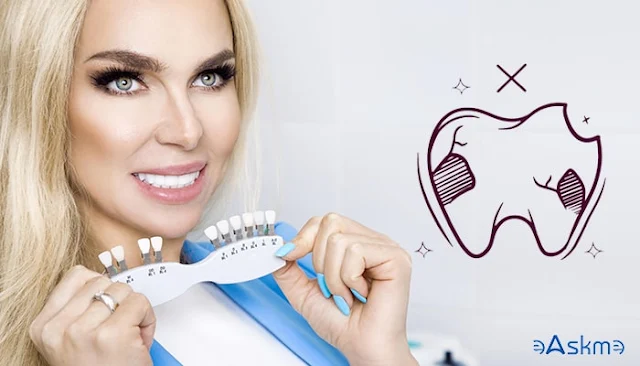Your teeth are essential to your daily life, from eating to speaking. Caring for them is crucial to maintaining a healthy smile and overall well-being.
You may brush and floss regularly, but did you know that common habits could harm your teeth without realizing it?
In this blog post, we will explore five surprising habits that can harm your teeth, their impact on oral health, and how to prevent damage.
 |
| Surprising Habits That Can Harm Your Teeth!: eAskme |
You might be surprised at what made the list, from sipping on your favorite drink to chomping down on some ice.
With the advice of a dental expert, Dr. Odufalu from Tri-city Family Dental, let's dive in and learn about these harmful habits to keep your pearly whites shining bright.
Poor Diet:
It's no secret that certain foods and beverages can be detrimental to our overall health, but did you know that they can also be bad for our teeth?
Unhealthy foods like sugary drinks, candy, and chips contain high amounts of sugar, which can damage your teeth and cause tooth decay.
Tooth decay occurs when harmful bacteria in our mouths feed on sugar left on our teeth, creating acid that erodes the enamel on our teeth. If left untreated, this can lead to cavities, tooth sensitivity, and even tooth loss.
Limiting your intake of sugary and acidic foods and drinks and brushing and floss regularly to keep your teeth healthy is important.
By being mindful of what you eat and drink, you can help protect your teeth from damage and maintain a healthy smile for years.
After that, it is important to remember that maintaining good oral health is about keeping your teeth and gums healthy and contributes to overall health and well-being.
A diet filled with unhealthy foods like sugary drinks, candy, and processed snacks can lead to cavities, gum disease, and other oral health problems that can have long-term consequences for your overall health.
These conditions can cause discomfort and pain and may even require costly dental treatments to repair.
Therefore, it is important to prioritize your oral health by consuming a balanced diet and practicing good oral hygiene habits like brushing and flossing regularly.
Doing so can reduce your risk of developing dental problems while improving your overall health.
Overuse of Tobacco and Alcohol:
Regarding our oral health, we often forget that our daily habits can drastically affect us. Tobacco and alcohol are among the most harmful habits that can significantly damage teeth and gums.
Tobacco consumption can lead to discolored teeth and bad breath but also has more severe effects, such as damaged enamel and lesions in the mouth.
Chewing tobacco can be especially damaging to the teeth, causing them to wear down and even fall out.
Additionally, the use of tobacco products also increases the risk of developing oral cancer.
Similarly, excessive alcohol consumption can also damage teeth and gums, leading to gum disease, tooth decay, and tooth loss.
It can also cause dry mouth, leading to a higher risk of cavities.
Overall, it's important to be mindful of our choices and habits regarding oral health and take appropriate measures to protect our teeth and gums.
Regarding oral health, certain substances can be quite harmful to your teeth.
Alcohol is one of them. Its excessive consumption can lead to weakened tooth enamel owing to its high acidity content, which can seriously increase the risk of tooth decay.
Alcohol abuse can also cause dry mouth, a condition where your mouth doesn't produce enough saliva. This lack of moisture can exacerbate oral health problems like gum disease and cavities.
Without enough saliva in the mouth, bacteria and food particles are not washed away, making it easier for plaque to form.
Over time, this plaque can wear away at the teeth and lead to decay.
Therefore, it's essential to limit your alcohol intake and prioritize good oral hygiene practices like regular brushing and flossing.
Besides the substances mentioned above, numerous other factors can damage teeth and contribute to poor dental health.
Poor oral hygiene, such as neglecting to brush and floss regularly, can accumulate harmful bacteria in the mouth and cavities.
Drinking sugary beverages or snacking on sugary foods can also wear away at the enamel of teeth over time.
Additionally, neglecting regular dental checkups and cleanings can allow small issues to develop into larger ones requiring more extensive treatment.
By being mindful of these potential dangers and preventing them, individuals can promote better dental health and avoid the negative consequences of poor oral hygiene.
Inadequate Oral Hygiene Practices:
Poor oral hygiene is one of the main reasons one's teeth can become bad. Neglecting oral hygiene practices, such as not brushing and flossing regularly, can lead to plaque buildup and cavities.
Plaque is a sticky film of bacteria that accumulates on our teeth, and if not removed by regular brushing and flossing, it can harden into tartar.
Tartar can be difficult to remove, leading to gum disease. Cavities are also a common problem caused by poor oral hygiene.
They occur when plaque produces acids that dissolve the outer layer of the teeth, leading to holes in the teeth.
To avoid these dental problems, brushing and flossing regularly is important, using fluoride toothpaste, limiting sugary and acidic foods, and visiting the dentist twice yearly for a check-up.
Following these simple steps can maintain good oral health and prevent dental diseases.
However, it is important to understand that bad habits and unhealthy lifestyle choices can severely damage teeth.
Neglecting oral hygiene by not brushing and flossing regularly, consuming sugary and acidic foods, and smoking can all contribute to enamel erosion, leading to weak and decay-prone teeth.
This irreversible damage can cause physical discomfort and emotional distress, as stained or missing teeth can affect one's appearance and confidence.
Therefore, it is crucial to prioritize good oral care practices, such as regular dental check-ups, a balanced diet, and refraining from harmful habits to prevent long-term damage to teeth.
Individuals can enjoy stronger and brighter smiles for years by taking proactive measures to maintain healthy teeth.
Skipping Professional Dental Visits:
Skipping professional dental visits can have severe consequences for your oral health.
Refrain from attending regular check-ups and cleanings to create a breeding ground for bacteria and plaque accumulating on your teeth.
Over time, this buildup can lead to cavities, gum disease, and other serious conditions that can significantly impact your overall well-being.
The harmful effects of not taking proper care of your teeth are not limited to just dental issues; poor oral health has also been linked to heart disease, diabetes, and certain types of cancer.
You must make time for professional dental visits at least twice a year and maintain good oral hygiene practices at home to keep your teeth and gums healthy.
Doing so can prevent potential problems and ensure that your smile stays bright and beautiful for years to come.
Again, it is important to remember that neglecting your dental health can lead to many problems down the road.
Consuming foods and drinks bad for your teeth, such as sugary and acidic beverages, can erode your tooth enamel over time.
Smoking and using other tobacco products can also cause significant damage to your oral health, including staining your teeth and increasing your risk of gum disease and oral cancer.
Therefore, it is crucial to make an effort to maintain good oral hygiene habits, including brushing and rinsing regularly, using fluoride toothpaste, and visiting your dentist for regular check-ups.
By taking these steps, you can help prevent future dental issues and promote better overall oral health.
Conclusion:
In conclusion, it's important to remember that our teeth are essential to our everyday lives and oral health. By being mindful of our habits, we can prevent unnecessary damage and maintain a healthy smile.
Limiting sugary drinks and snacks, avoiding chewing on hard objects, and properly caring for our teeth with regular brushing and flossing can go a long way in ensuring optimal oral health.
Keep these five surprising habits in mind as you go about your day-to-day routine, and make the necessary changes to protect your teeth and preserve your beautiful smile!
Still have any question, do share via comments.
Share this post with your friends and family.
Don't forget to like us FB and join the eAskme newsletter to stay tuned with us.
Other handpicked guides for you;



.jpg)



.jpg)















